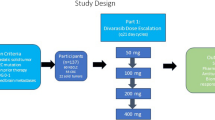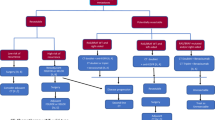Abstract
Outcomes for metastatic colorectal cancer have improved progressively with the incorporation of new drugs into standard treatment regimens. Most recently, targeted therapies against VEGF and EGFR have improved upon the prior standard for first-line therapy with FOLFOX or FOLFIRI. As attempts to combine anti-VEGF and anti-EGFR drugs have been unsuccessful, it is necessary to choose between them when beginning first-line therapy. This review summarizes the existing literature to best inform this decision. To date, three head-to-head trials have compared anti-EGFR and anti-VEGF therapy in RAS wild-type patients: PEAK, FIRE-3, and CALGB/SWOG 80405. PEAK and FIRE-3 suggested a survival advantage for anti-EGFR therapy over anti-VEGF therapy, though CALGB/SWOG 80405 did not. Results have emerged recently to suggest that tumors arising from the right colon are resistant to anti-EGFR therapy, and that any advantage of anti-EGFR therapy over anti-VEGF therapy may be limited to left-sided tumors.
Similar content being viewed by others
References
Papers of particular interest, published recently, have been highlighted as: • Of importance •• Of major importance
Cancer stat facts: colon and rectum cancer. (Surveillance, Epidemiology, and End Results Program (SEER)).
Cook AD, Single R, McCahill LE. Surgical resection of primary tumors in patients who present with stage IV colorectal cancer: an analysis of surveillance, epidemiology, and end results data, 1988 to 2000. Ann Surg Oncol. 2005;12:637–45.
Gustavsson B, et al. A review of the evolution of systemic chemotherapy in the management of colorectal cancer. Clin Colorectal Cancer. 2015;14:1–10.
Hurwitz H, et al. Bevacizumab plus irinotecan, fluorouracil, and leucovorin for metastatic colorectal cancer. N Engl J Med. 2004;350:2335–42.
Saltz LB, et al. Bevacizumab in combination with oxaliplatin-based chemotherapy as first-line therapy in metastatic colorectal cancer: a randomized phase III study. J Clin Oncol Off J Am Soc Clin Oncol. 2008;26:2013–9.
Van Cutsem E, et al. Cetuximab and chemotherapy as initial treatment for metastatic colorectal cancer. N Engl J Med. 2009;360:1408–17.
Van Cutsem E, et al. Cetuximab plus irinotecan, fluorouracil, and leucovorin as first-line treatment for metastatic colorectal cancer: updated analysis of overall survival according to tumor KRAS and BRAF mutation status. J Clin Oncol Off J Am Soc Clin Oncol. 2011;29:2011–9.
Douillard J-Y, et al. Randomized, phase III trial of panitumumab with infusional fluorouracil, leucovorin, and oxaliplatin (FOLFOX4) versus FOLFOX4 alone as first-line treatment in patients with previously untreated metastatic colorectal cancer: the PRIME study. J Clin Oncol Off J Am Soc Clin Oncol. 2010;28:4697–705.
Douillard JY, et al. Final results from PRIME: randomized phase III study of panitumumab with FOLFOX4 for first-line treatment of metastatic colorectal cancer. Ann Oncol Off J Eur Soc Med Oncol. 2014;25:1346–55.
Tol J, et al. Chemotherapy, bevacizumab, and cetuximab in metastatic colorectal cancer. N Engl J Med. 2009;360:563–72.
Hecht JR, et al. A randomized phase IIIB trial of chemotherapy, bevacizumab, and panitumumab compared with chemotherapy and bevacizumab alone for metastatic colorectal cancer. J Clin Oncol Off J Am Soc Clin Oncol. 2009;27:672–80.
Dotan E, et al. A phase II study of capecitabine, oxaliplatin, and cetuximab with or without bevacizumab as frontline therapy for metastatic colorectal cancer. A Fox Chase extramural research study. J Gastrointest Cancer. 2012;43:562–9.
Li X, Wang M, Liu G-Y, Ma J-L. Dual VEGF/EGFR inhibition versus single targeted agent treatment in patients with metastatic colorectal cancer: a meta-analysis of randomized trials. Int J Color Dis. 2016;31:1655–6.
•• Schwartzberg LS, et al. PEAK: a randomized, multicenter phase II study of panitumumab plus modified fluorouracil, leucovorin, and oxaliplatin (mFOLFOX6) or bevacizumab plus mFOLFOX6 in patients with previously untreated, unresectable, wild-type KRAS exon 2 metastatic colorectal cancer. J Clin Oncol Off J Am Soc Clin Oncol. 2014;32:2240–7. This manuscript reports results of the PEAK trial, one of the three clinical trials to compare anti-VEGF and anti-EGFR therapy head-to-head in the first-line setting.
•• Heinemann V, et al. FOLFIRI plus cetuximab versus FOLFIRI plus bevacizumab as first-line treatment for patients with metastatic colorectal cancer (FIRE-3): a randomised, open-label, phase 3 trial. Lancet Oncol. 2014;15:1065–75. This manuscript reports results of the FIRE-3 trial, one of the three clinical trials to compare anti-VEGF and anti-EGFR therapy head-to-head in the first-line setting.
Stintzing S, et al. FOLFIRI plus cetuximab versus FOLFIRI plus bevacizumab for metastatic colorectal cancer (FIRE-3): a post-hoc analysis of tumour dynamics in the final RAS wild-type subgroup of this randomised open-label phase 3 trial. Lancet Oncol. 2016;17:1426–34.
Modest DP, et al. Impact of subsequent therapies on outcome of the FIRE-3/AIO KRK0306 trial: first-line therapy with FOLFIRI plus cetuximab or bevacizumab in patients with KRAS wild-type tumors in metastatic colorectal cancer. J Clin Oncol Off J Am Soc Clin Oncol. 2015;33:3718–26.
•• Venook AP, Niedzwiecki D, Lenz HJ, et al. CALGB/SWOG 80405: Phase III trial of irinotecan/5-FU/leucovorin (FOLFIRI) or oxaliplatin/5-FU/leucovorin (mFOLFOX6) with bevacizumab (BV) or cetuximab (CET) for patients (pts) with KRAS wild-type (wt) untreated metastatic adenocarcinoma of the colon or rectum (MCRC). J Clin Oncol 2014;32(5s (suppl; abstr LBA3)). This presentation reports results of the PEAK trial, one of the three clinical trials to compare anti-VEGF and anti-EGFR therapy head-to-head in the first-line setting.
Lenz, H.-J. CALGB/SWOG 80405: Phase III trial of FOLFIRI or mFOLFOX6 with bevacizumab or cetuximab for patients with expanded RAS analyses in untreated metastatic adenocarcinoma of the colon or rectum. (2014).
Khattak MA, Martin H, Davidson A, Phillips M. Role of first-line anti-epidermal growth factor receptor therapy compared with anti-vascular endothelial growth factor therapy in advanced colorectal cancer: a meta-analysis of randomized clinical trials. Clin Colorectal Cancer. 2015;14:81–90.
Heinemann V, et al. A study-level meta-analysis of efficacy data from head-to-head first-line trials of epidermal growth factor receptor inhibitors versus bevacizumab in patients with RAS wild-type metastatic colorectal cancer. Eur J Cancer Oxf Engl. 2016;1990(67):11–20.
Wang H, et al. Efficacy and safety of anti-epidermal growth factor receptor therapy compared with anti-vascular endothelial growth factor therapy for metastatic colorectal cancer in first-line and second-line therapies: a meta-analysis. OncoTargets Ther. 2016;9:5405–16.
Pietrantonio F, et al. First-line anti-EGFR monoclonal antibodies in panRAS wild-type metastatic colorectal cancer: a systematic review and meta-analysis. Crit Rev Oncol Hematol. 2015;96:156–66.
• Kumachev A, et al. A systematic review and network meta-analysis of biologic agents in the first line setting for advanced colorectal cancer. PLoS One. 2015;10:e0140187. This manuscript, including both a direct meta-analysis of the PEAK, FIRE-3, and CALGB/SWOG 80405 studies and a network meta-analysis incorporating other first-line trials of anti-VEGF or anti-EGFR therapy, is the most comprehensive synthesis to date of all available data informing the choice between these two drug classes.
Schrag, D. The relationship between primary tumor sidedness and prognosis in colorectal cancer.
• Venook, A. Impact of primary (1o) tumor location on overall survival (OS) and progression-free survival (PFS) in patients (pts) with metastatic colorectal cancer (mCRC): Analysis of CALGB/SWOG 80405 (Alliance). A retrospective analysis of CALGB/SWOG 80405 data with respect to tumor primary site location, this report was the first to highlight the importance of tumor location for the efficacy of anti-EGFR therapy.
• Tejpar S, et al. Prognostic and predictive relevance of primary tumor location in patients with RAS wild-type metastatic colorectal cancer: retrospective analyses of the CRYSTAL and FIRE-3 trials. JAMA Oncol. 2016; doi:10.1001/jamaoncol.2016.3797. This manuscript added further evidence to support the finding of limited benefit of anti-EGFR in right-sided tumors.
•• Holch JW, Ricard I, Stintzing S, Modest DP, Heinemann V. The relevance of primary tumour location in patients with metastatic colorectal cancer: a meta-analysis of first-line clinical trials. Eur J Cancer Oxf Engl. 2017;70:87–98. Including all relevant trials, this meta-analysis is the most comprehensive assessment to date of the impact of primary tumor location on efficacy of anti-VEGF and anti-EGFR therapies.
Yamauchi M, et al. Colorectal cancer: a tale of two sides or a continuum? Gut. 2012;61:794–7.
Lee MS, et al. Association of CpG island methylator phenotype and EREG/AREG methylation and expression in colorectal cancer. Br J Cancer. 2016;114:1352–61.
Viloria-Petit A, et al. Acquired resistance to the antitumor effect of epidermal growth factor receptor-blocking antibodies in vivo: a role for altered tumor angiogenesis. Cancer Res. 2001;61:5090–101.
Author information
Authors and Affiliations
Corresponding author
Ethics declarations
Conflict of Interest
Aaron P. Mitchell declares that he has no conflict of interest. Hanna K. Sanoff has received research support through grants from Bayer, Novartis, Merck, Precision Biologics, and Immunomedics.
Human and Animal Rights and Informed Consent
This article does not contain any studies with human or animal subjects performed by any of the authors.
Additional information
Topical Collection on Systemic Therapies in Colorectal Cancer
Rights and permissions
About this article
Cite this article
Mitchell, A.P., Sanoff, H.K. Anti-EGFR and Anti-VEGF Agents in First-Line Therapy for Advanced Colorectal Cancer. Curr Colorectal Cancer Rep 13, 257–263 (2017). https://doi.org/10.1007/s11888-017-0372-7
Published:
Issue Date:
DOI: https://doi.org/10.1007/s11888-017-0372-7




